Looking for the best tools to manage and enhance your team’s skills? In this blog, we’re diving into the 15 best Competency Management Software solutions of 2026 designed to help you build, track, and boost your workforce’s performance like never before.
Managers need to build strong teams, but without knowing their employees’ skills, it can be hard to succeed. Who’s ready to step up? Who needs support? Where are the gaps? These questions often go unanswered until a deadline is missed or a promising employee leaves.
The reality is, most teams operate on assumptions. Competency data sits in spreadsheets, outdated org charts, or people’s heads. Development plans feel generic, reviews are subjective, and training rarely hits the mark. Without a central system to track and improve skills, growth becomes unplanned for both managers and employees.
A modern competency management system changes that.It helps managers see their team’s skills clearly, spot issues early, and create focused development plans. No more guesswork — just clarity, direction, and strategic growth.
Comparsion: Best 5 Competency Management Systems shortlist
Here’s my pick of the 5 best software from the 15 tools reviewed.
| Tool | Best For | Key Advantages | Ideal Company Size |
| Peoplebox.ai | Competency mapping + performance + OKRs | Modern UI, Slack/Teams automation, 360°, async reviews, analytics | Startups → Enterprises |
| TalentGuard | AI skills profiling + career pathing | Skill models, job descriptions, learning mapping | Mid–large enterprises |
| Cornerstone Performance | Enterprise performance automation | Goal alignment, succession, analytics | Large enterprises |
| Avilar | Workforce planning + skill inventories | Deep skill assessments, training alignment | Government, NGOs, large orgs |
| Kahuna | Operational skill visibility & team matrices | Team heatmaps, real-time qualification, flexible assessments | Healthcare, energy, field ops, manufacturing |
Why Managers Need It More Than Ever
Let’s cut to what really matters:
- Clarity for managers: Understand who brings what to the table.
- Direction for employees: Clear development pathways build motivation and trust.
- Data for decisions: No more hunches during performance reviews or succession planning.
A good competency management tool creates a shared language around performance, capability, and growth. It transforms performance reviews from vague feedback to skill-based, future-focused conversations.
Best Competency Management Software Worth Exploring
With so many options available, choosing the right competency management software can be tough. This guide highlights top platforms with key features, benefits, and use cases—so you can quickly find the best fit for your team’s needs.
1. Peoplebox.ai

Peoplebox.ai provides an intelligent platform for managing and developing employee competencies.
It helps organizations identify skill gaps, create personalized development plans, and integrate competencies with performance management, ultimately fostering a more skilled and high-performing workforce.
Key Features:
- Competency Mapping: Aligns individual competencies with organizational goals for streamlined performance.
- OKR (Objectives and Key Results) Management: OKR facilitates setting and tracking of company-wide and individual goals.
- 360-Degree Feedback: 360 degree enables comprehensive performance reviews from multiple stakeholders.
- 1:1 Meetings: 1:1 supports regular check-ins between managers and team members.
- Engagement Surveys: Collects employee feedback to gauge engagement levels.
- Performance Reviews: Offers customizable templates and workflows for performance evaluations.
- Integration with Slack and Microsoft Teams: Allows conducting reviews and check-ins within these platforms.
- Real-Time Analytics: Provides insights into performance metrics and goal progress.
Want to see how Peoplebox can streamline competency management for your team? Book a quick demo.
Pros:
- User-Friendly Interface
- Comprehensive Feature Set
- Seamless Integrations
- Customizable Templates
- Responsive Support
Pricing:
| Plan Name | Price | Billing Type |
| Talent Management Plan | $7/user/month | Annual billing |
| OKR Platform Plan | $8/user/month | Annual billing |
| Full Suite – Professional | $12/user/month | Annual billing |
| Full Suite – Premium | $15/user/month | Annual billing |
| Enterprise Plan | Custom pricing | Annual billing |
User Volume:
Peoplebox.ai is trusted by over 600 organizations worldwide, ranging from dynamic startups to established enterprises. Notable clients include Razorpay, Khatabook, Nova Benefits, Ula, Talent500, Disney, Postman, Veriff, and Redbus.
These companies leverage Peoplebox.ai to streamline performance management, align objectives, and enhance employee engagement.
Rating:
- Capterra: 4.6/5 based on 244 reviews
- G2: 4.5/5 based on 357 reviews
| Read more about competencies here:35 Core Competencies Examples35 Performance Review Competencies Examples in 202467 Lominger Competencies |
2. TalentGuard
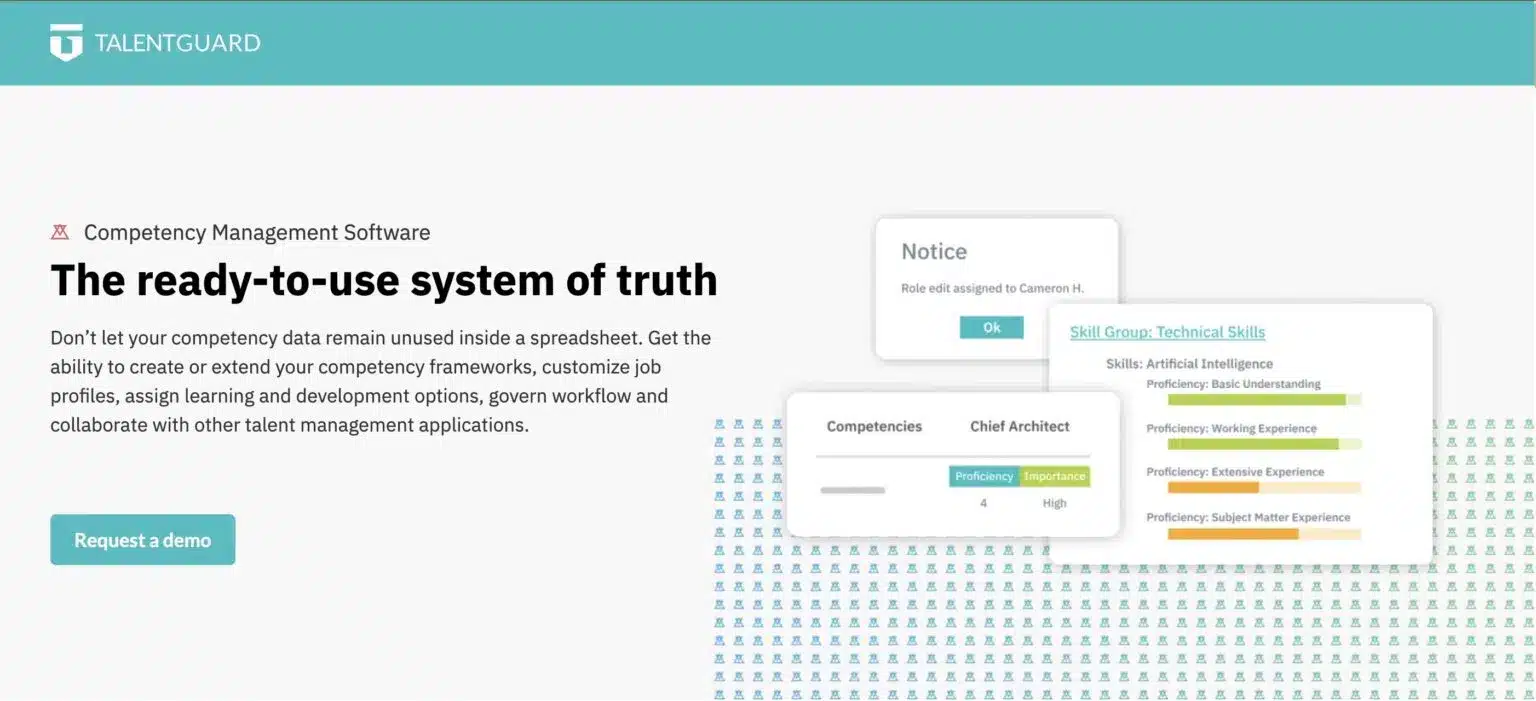
TalentGuard is an AI-based platform that helps companies understand and grow employee skills.
It offers tools for skill profiling, job description creation, learning mapping, career pathing, gap analysis, and performance measurement, enabling businesses to align workforce capabilities with organizational goals.
Key Features:
- Skill and Competency Profiles: Make clear profiles to see what employees are good at and where they can improve.
- Job Descriptions: Develop standardized job descriptions that align with organizational needs.
- Learning Mapping: Match learning content to specific skills to support focused employee growth.
- Career Pathing: Chart clear career progression paths to guide employee growth and retention.
- Gap Analysis: Identify skill gaps through assessments and provide actionable insights for improvement.
- Performance Measurement: Track and evaluate employee performance to inform development strategies.
Pros:
- Comprehensive Talent Management
- AI-Driven Insights
- Customizable Frameworks
- User-Friendly Interface
Cons:
- Limited Reporting Capabilities
- Customization Challenges
- Integration Limitations
Pricing:
TalentGuard offers flexible pricing plans starting at $3 per user per month. For detailed pricing information and to request a quote, visit their official website.
User Volume:
TalentGuard works with medium and large companies in industries like healthcare, finance, and tech. It lets these businesses create and track the specific skills needed for their work.
Rating:
- G2: 4.5/5 based on user reviews.
- Capterra: 4.6/5 based on user reviews.
3. Cornerstone Performance

Cornerstone Performance uses AI to help connect what employees do with what the business wants to achieve. It automates reviews, maps skills, aligns goals, plans for future leaders, and gathers feedback. This helps companies build a culture of ongoing growth and flexibility.
Key Features:
- Performance Reviews Automation: Streamlines evaluations with customizable assessments and goal tracking, facilitating regular, meaningful coaching conversations.
- Skills Graph: It uses AI to see what skills people have and what they need, then suggests ways to learn and grow in their careers.
- Goal Alignment: Ensures individual, team, and organizational goals are interconnected, promoting transparency and accountability.
- Succession Management: Identifies high-potential talent and prepares them for future leadership roles through targeted development plans.
- Engagement Surveys: Collects employee feedback to gauge engagement levels and inform strategic decisions.
Pros:
- Comprehensive Feature Set
- AI-Driven Insights
- Customizable Frameworks
- User-Friendly Interface
Cons:
- Learning Curve
- Customization Challenges
- Integration Limitations
Pricing:
Cornerstone Performance offers flexible pricing plans tailored to organizational needs. For detailed pricing information and to request a quote, visit their official website.
User Volume:
Lots of different companies, big and okay-sized, in health, money, shops, and tech use Cornerstone Performance.
Rating:
- G2: 4.3/5 based on user reviews.
- Capterra: 4.2/5 based on user reviews.
4. Avilar
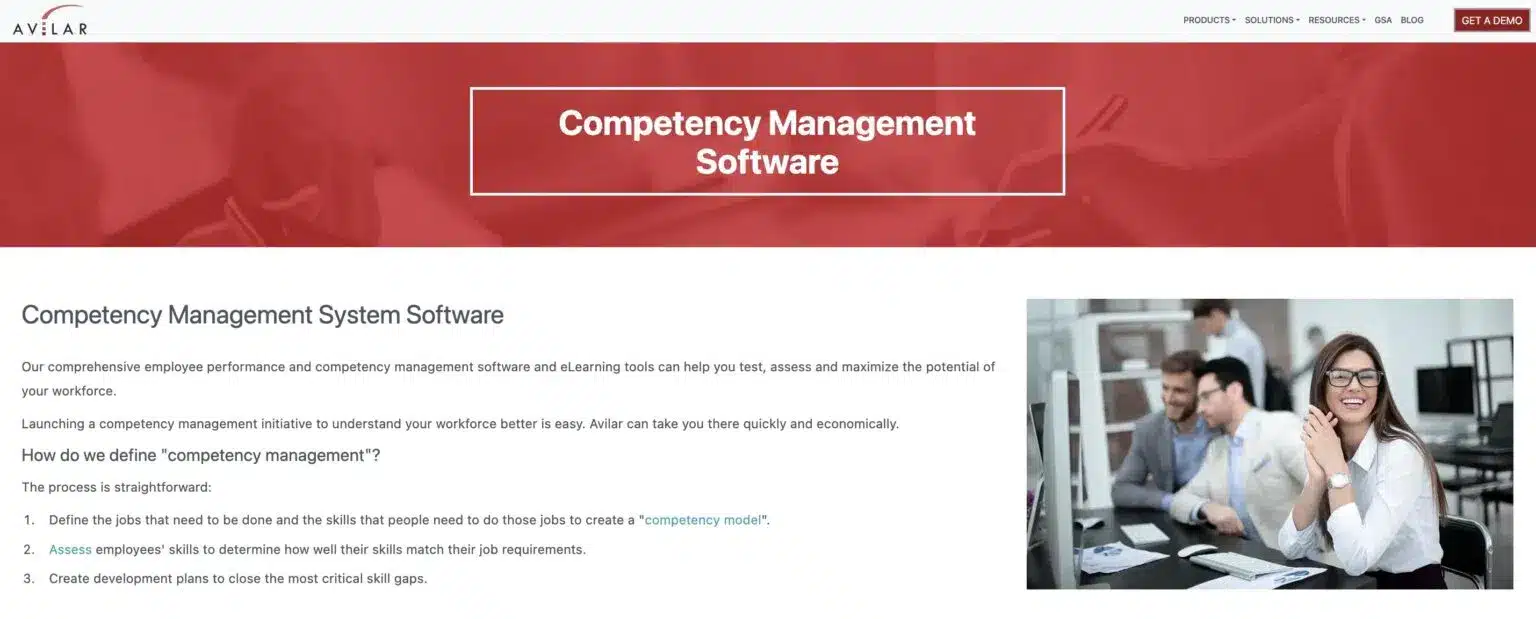
Avilar helps companies manage employee skills. Their software, WebMentor Skills™, helps find what skills people have, see where there are gaps, and plan training and who might move up in the company. This helps businesses use their people better.
Key Features:
- Skill Gap Identification: It uses tests to see where employees need to improve, so they can get the right training.
- Training Alignment: It makes sure that training is focused on the exact skills employees need to improve, so the training works better.
- Skills Inventories: It keeps track of all the skills employees have, which helps plan who to hire and how to help people grow in their jobs.
- Succession Planning: It finds employees who could be leaders and gets them ready, so the company has people to take on bigger roles later.
- Assessments: Offers customizable evaluation tools to measure employee competencies accurately.
Pros:
- Comprehensive Competency Framework
- Customizable Assessments
- User-Friendly Interface
Cons:
- Limited Third-Party Integrations
- Customization Complexity
Pricing:
Avilar’s pricing is flexible, starting at $1.00 per user per month, with a one-time setup fee of $2,500. Advanced customizations may incur additional costs.
User Volume:
Avilar works with many kinds of groups, like businesses, government offices, and charities. They can help organizations with anywhere from 50 to 250,000 people learning and using the system.
Rating:
- Serchen: 4.0/5 based on user reviews.
5. Kahuna
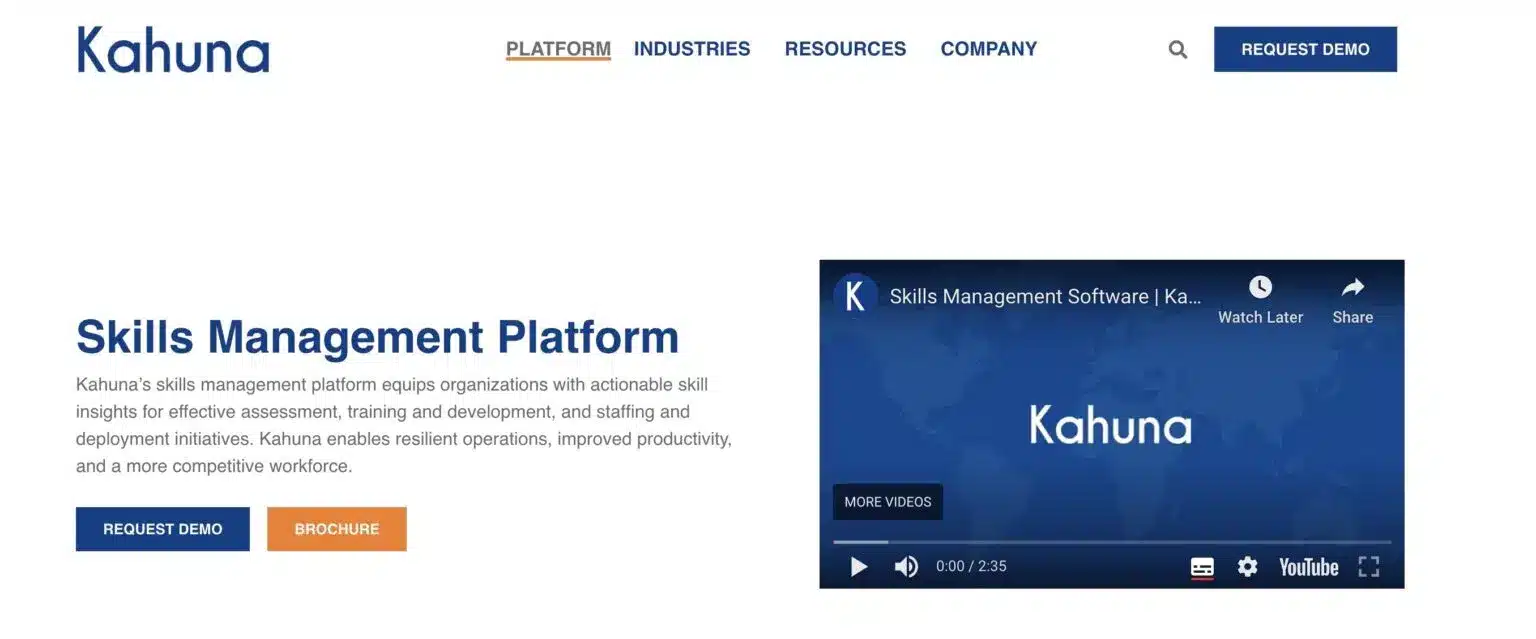
Kahuna is a special system for managing employee skills. It helps companies see where skills are missing, match training to those needs, and plan who can do what in real-time. This helps businesses make smart choices about how to train and use their employees.
Key Features:
- Skills Dashboard: See everyone’s skills in one place, showing how good they are and what they can improve.
- Team Matrix: Get a clear picture of team skills, so managers know who’s good at what and where the team needs help.
- Different Ways to Check Skills: Use checklists, quizzes, watching people work, and real work tests to see how well employees can do things.
- Training that Fits: Connects training directly to the skills employees need to learn.
- Plan for the Future: See the team’s current skills and plan for the skills needed later on.
Pros:
- Comprehensive Skill Visibility
- Flexible Assessment Options
- Integration Capabilities
- User-Friendly Interface
Cons:
- Pricing Transparency
- Learning Curve
Pricing:
Kahuna offers customized pricing based on organizational needs and size. For detailed pricing information and to request a quote, visit their official website.
User Volume:
Kahuna helps many different kinds of companies, both medium and large. These include businesses in healthcare, energy, making things, and services done out in the field.
Rating:
Other Competency Management Software Options
Still exploring? These alternative competency management solutions are worth considering for their distinct capabilities and flexibility.
- iMocha
- Cognology
- SC Training (formerly EdApp)
- SAP SuccessFactors
- Oracle HCM Cloud
- Workday Skills Cloud
- Mintra
- Nestor
- SkillsDB
- HRSG CompetencyCore
6. iMocha
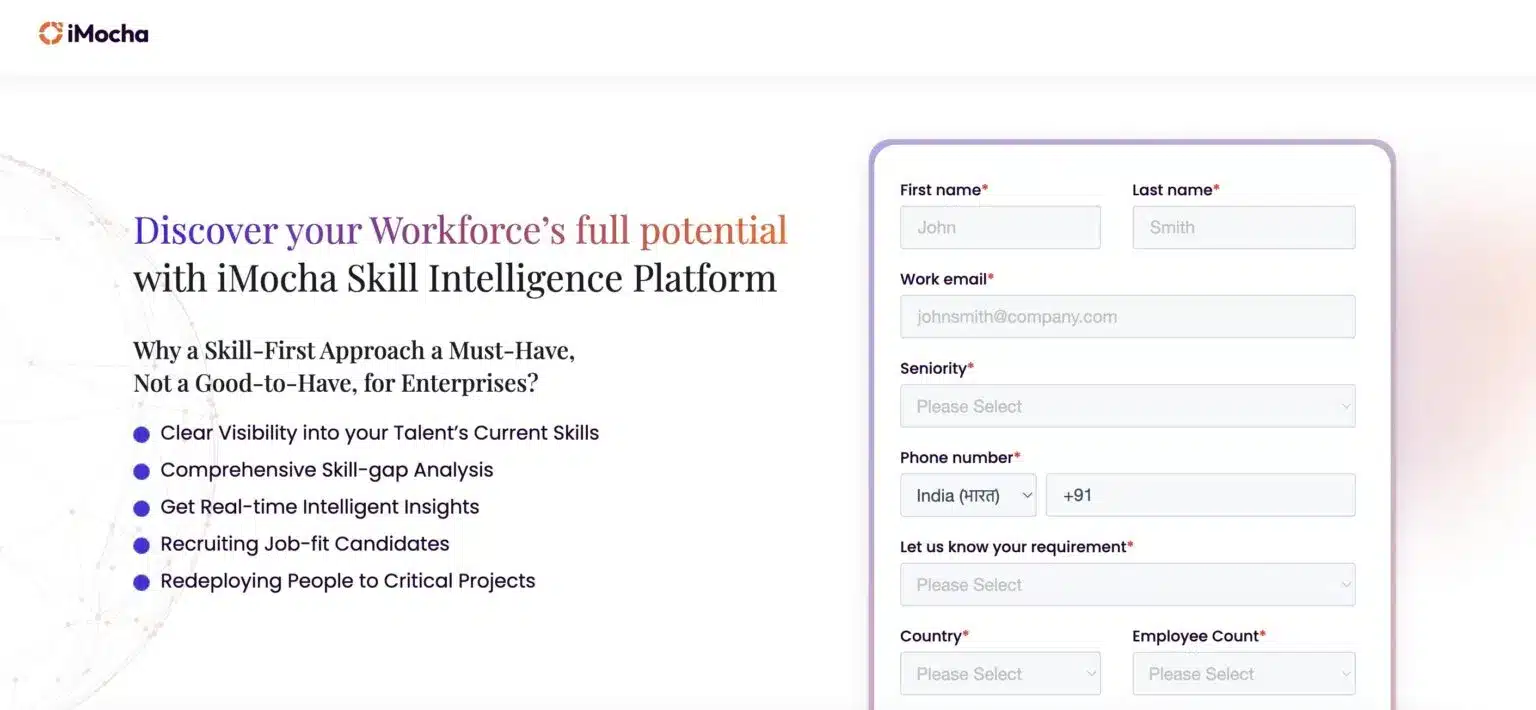
iMocha is an AI-powered system that helps companies focus on skills when hiring and developing employees.
It has lots of tests, uses AI to understand skills, and works with other HR systems. This helps businesses see where skills are missing, plan training, and make good choices about their people.
Key Features:
- Skills-First: Look at what people can do, not just their degrees or job titles.
- Smart Analysis: Uses AI to show how good people are at different skills, helping with hiring and growth decisions.
- Works with HR Systems: Connects easily to other HR software to keep information flowing.
- Lots of Skill Tests: Offers over 3,000 tests for technical skills, job-related skills, and people skills.
- Quick Results: Gives fast feedback on tests, so companies can quickly find talented people and see where others need to improve.
Pros:
- Extensive Assessment Library
- Advanced Proctoring Features
- User-Friendly Interface
- Responsive Customer Support
Cons:
- Learning Curve
- Limited Offline Capabilities
Pricing:
$400/month (billed annually) – For detailed pricing information and to request a quote, visit their official website.
User Volume:
iMocha helps many different kinds of companies, from brand new ones to really big ones. They work with businesses in areas like computers, money, health, and schools.
Rating:
- G2: 4.4/5 based on user reviews.
- Capterra: 4.5/5 based on user reviews.
7. Cognology
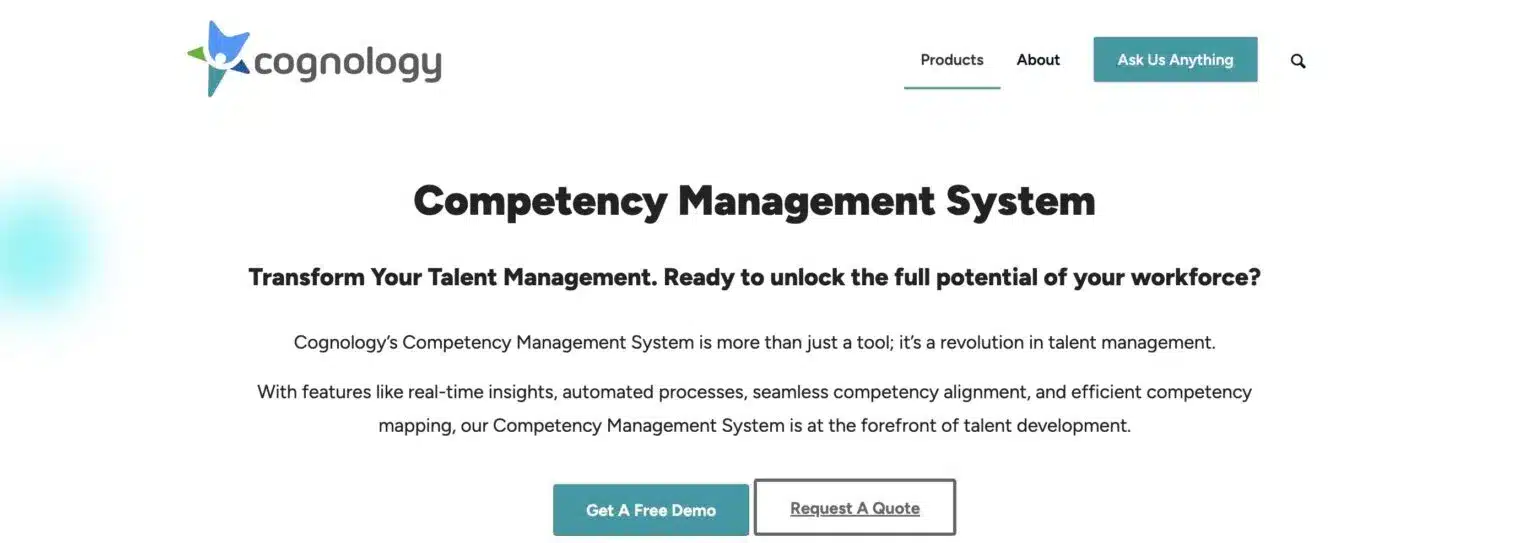
Cognology is a flexible system for managing talent that helps HR work more smoothly and improves how employees grow.
It lets companies set it up how they need and works well with other systems. This helps them connect employee skills to their main goals, get regular feedback, and help people move forward in their careers.
Key Features:
- Custom Frameworks: You can create your own skill sets that match the specific jobs and needs of your company.
- Self-Service Portal: Employees can see their own learning plans and make changes, which gives them more say and makes them care more.
- Career Linking: Skills are connected to different career paths, so it’s clear how people can move up and who might be ready for future roles.
- Continuous Feedback: Implement real-time feedback mechanisms to promote a culture of continuous improvement.
- Competency Matrix: See the skill levels of different teams to find where there are gaps and what training is needed.
- Integration Support: Seamlessly integrate with existing HRIS, LMS, payroll, and recruitment systems to ensure cohesive operations.
Pros:
- Highly Customizable
- User-Friendly Interface
- Comprehensive Support
- Scalable Solutions
Cons:
- Limited Pricing Transparency
- Learning Curve
Pricing:
Cognology offers flexible pricing plans starting from $5 per user per month. For detailed pricing information and to request a quote, visit their official website.
User Volume:
Cognology serves a diverse clientele, including over 250 organizations across various industries such as healthcare, education, and finance.
Rating:
- Capterra: 4.7/5 based on 24 reviews.
8. SC Training (EdApp)
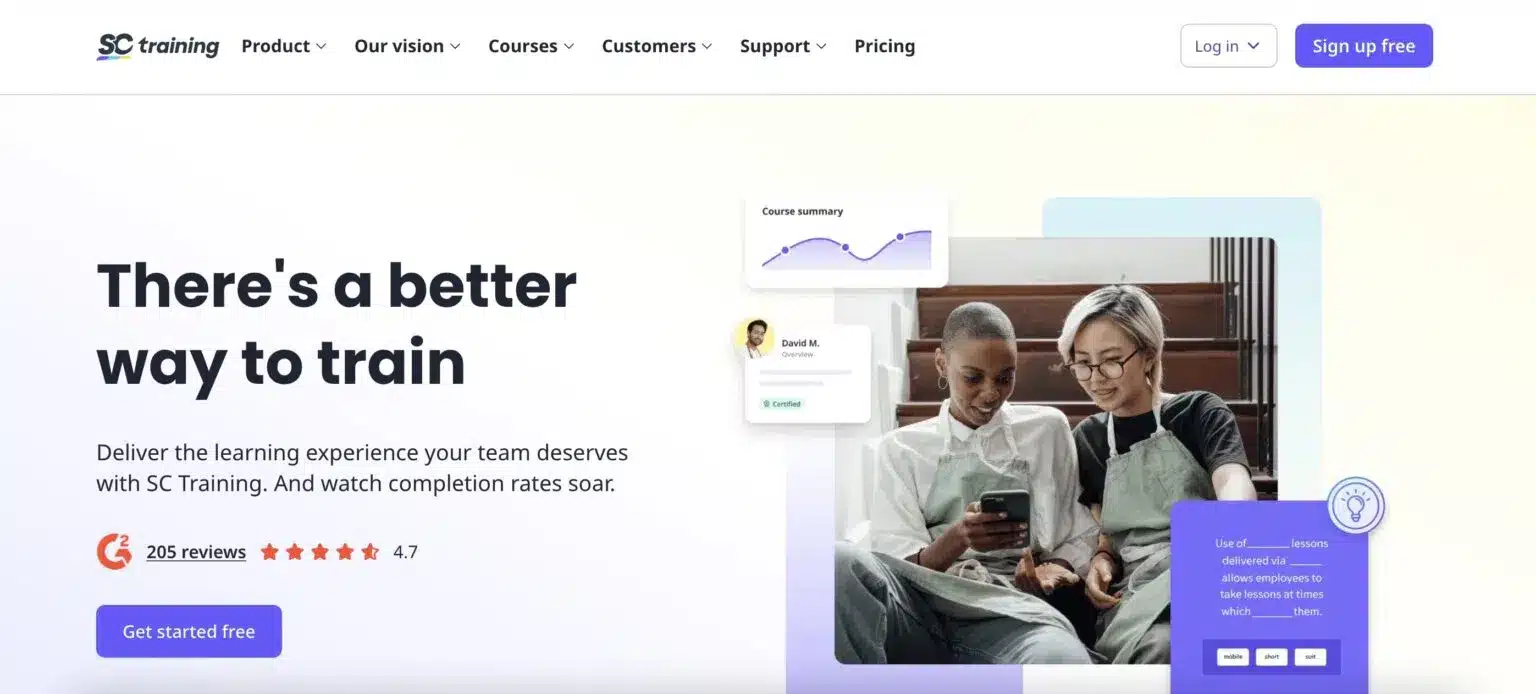
SC Training is a learning system that’s designed for phones and gives quick, enjoyable lessons to teams that are often on the front lines.
It has tools to create online lessons, do assessments while working, certify teams, use AI to build courses, and add game-like features. This helps companies make learning better and improve how their teams perform.
Key Features:
- Make Digital Lessons: Use over 80 fun templates to create courses with videos, quizzes, games, and tests.
- Assess Skills on the Job: Check how well people use their skills in actual work situations.
- Team Certification: Issue certifications upon course completion, verifying team competencies and compliance.
- AI Course Builder: Leverage AI to generate entire courses, convert existing content, or assist in lesson creation.
- Gamification: Enhance engagement through features like leaderboards, achievements, and real rewards.
Pros:
- User-Friendly Interface
- Extensive Course Library
- Mobile Accessibility
- AI-Driven Efficiency
Cons:
- Limited Free Plan Features
- Customization Complexity
Pricing:
$5 per learner/month (billed annually) with a minimum of one admin at $24/month. Custom pricing for organizations with 500+ users, providing tailored configurations and support.
User Volume:
SC Training helps many different kinds of companies, from small ones to big ones. They work with businesses in areas like stores, hotels, healthcare, and making things.
Rating:
- G2: 4.7/5 based on 219 reviews.
- Capterra: 4.7/5 based on user reviews.
9. SAP SuccessFactors
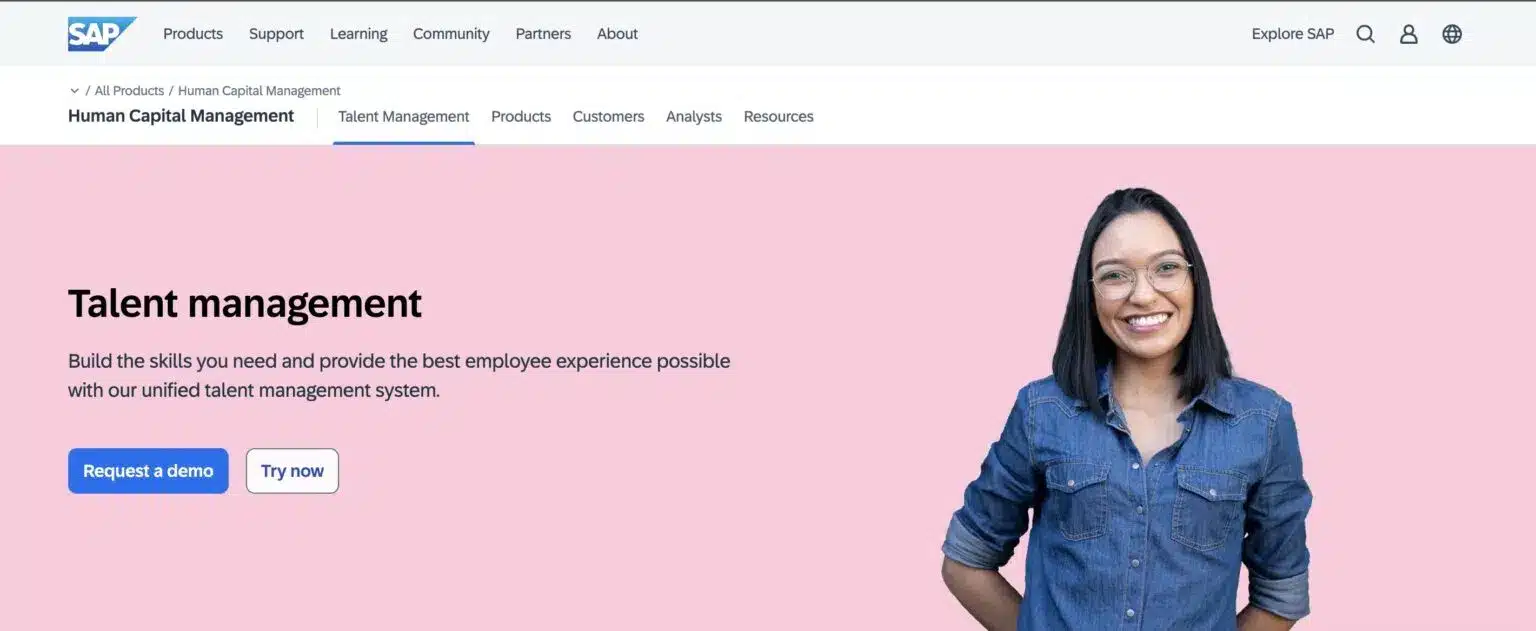
SAP SuccessFactors is a full set of HR tools that helps companies find, grow, and keep talented employees.
With AI-powered talent intelligence and real-time skill insights, it enables businesses to align competencies with strategic objectives, foster continuous feedback, and support employee development.
Key Features:
- Smart AI for Growth: Uses AI to suggest personalized learning and career moves, helping employees grow and feel more involved.
- Up-to-Date Skill Info: Shows the current skills of the workforce, helping with planning and managing talent proactively.
- Skills Match Goals: Connects what individual employees are good at with what the company wants to achieve.
- Ongoing Feedback: Makes it easy to have regular talks about performance and give feedback, so everyone can keep improving.
- Tracks Development: It watches how employees are developing, so managers can see where they need more skills and figure out how to help them.
Pros:
- Comprehensive HCM Suite
- AI-Driven Insights
- Global Capabilities
- Scalable Solutions
Cons:
- Complex Implementation
- Pricing Transparency
Pricing:
SAP SuccessFactors costs between $28 and $38 per person each month, but it depends on which features you need. To find out the exact price for your company, check their website for a quote.
User Volume:
SAP SuccessFactors is used by more than 10,000 different companies around the world, in many areas like healthcare, money, stores, and tech.
Rating:
- G2: 4.0/5 based on user reviews.
- Capterra: 4.2/5 based on user reviews.
10. Oracle HCM Cloud

Oracle HCM Cloud is a complete set of HR tools that helps companies manage their employees well.
By using clever AI for managing talent and seeing all employee skills together, it helps companies make sure the right people have the right abilities for their goals. It also helps employees learn new skills and simplifies HR work.
Key Features:
- Skills-First Talent: Focuses on skills to make hiring, career growth, and learning better as the company’s needs change.
- Supports Upskilling: Helps companies find and close skill gaps so employees can learn what’s needed for the future.
- One Place for Skills: Offers a single system to see and manage all employee skills, making sure they match company goals.
Pros:
- Comprehensive Functionality
- AI-Driven Insights
- Global Reach
Cons:
- Complex Implementation
- Pricing Transparency
Pricing:
Oracle HCM Cloud costs between $4 and $15 per person each month, depending on the features you choose.
User Volume:
Oracle HCM Cloud helps many different kinds of companies, big and medium-sized, in various industries. Their system can grow to fit the needs of different-sized businesses.
Rating:
- G2: 3.5/5 based on 530 reviews.
- Capterra: 3.9/5 based on 73 reviews.
11. Workday
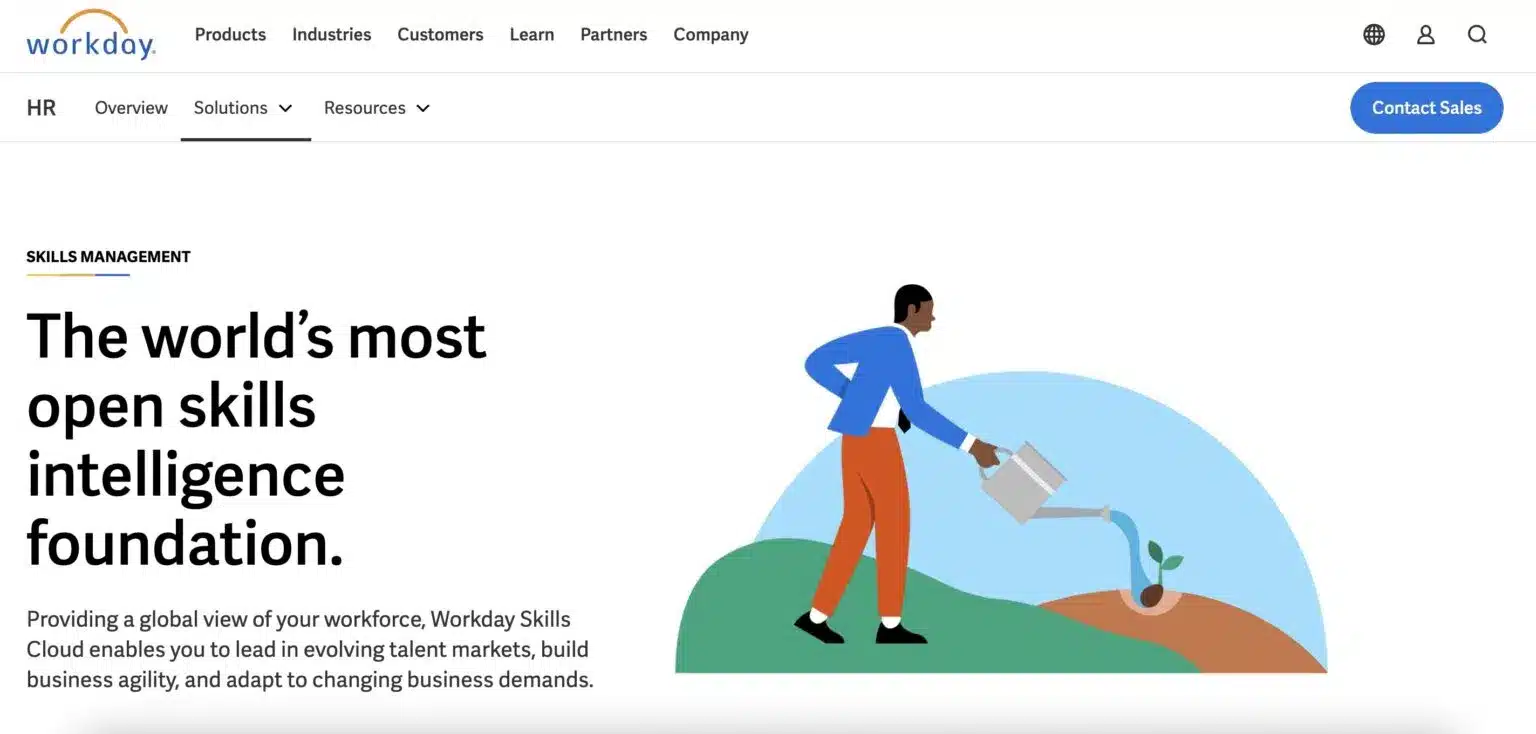
Workday Skills Cloud is a smart, AI-powered system that gives companies a full picture of all the skills their employees have.
By leveraging machine learning and a vast skills ontology, it enables businesses to align talent with organizational goals, identify skill gaps, and support continuous employee development.
Key Features:
- Skills Cloud: Uses a standard way of understanding job skills to accurately match skills and figure out related skills.
- Works with Workday: Connects smoothly with other Workday tools for managing talent, learning, and hiring, so everything works together.
- See All Skills: Gives a single, up-to-date view of all the skills across the company, helping with planning.
- Match Talent to Needs: Connects employee skills with what the company needs, supporting moving people to new roles and focused development.
- Track Skill Changes: Shows trends in skills, helping the company plan for future talent needs.
Pros:
- Comprehensive Skills Ontology
- AI-Powered Insights
- Enhanced Talent Mobility
- Real-Time Analytics
Cons:
- Complex Implementation
- Data Maintenance
Pricing:
Workday Skills Cloud usually charges a subscription fee, and the exact cost depends on how big your company is and what features you need. For detailed pricing information, it’s recommended to contact Workday directly.
User Volume:
Workday Skills Cloud serves a diverse clientele, including over 2,100 organizations and 150,000+ users worldwide, across various industries such as healthcare, finance, retail, and technology.
Rating:
- G2: 4.0/5 based on 1,300+ reviews.
- Capterra: 4.5/5 based on 1,330+ reviews.
12. Mintra
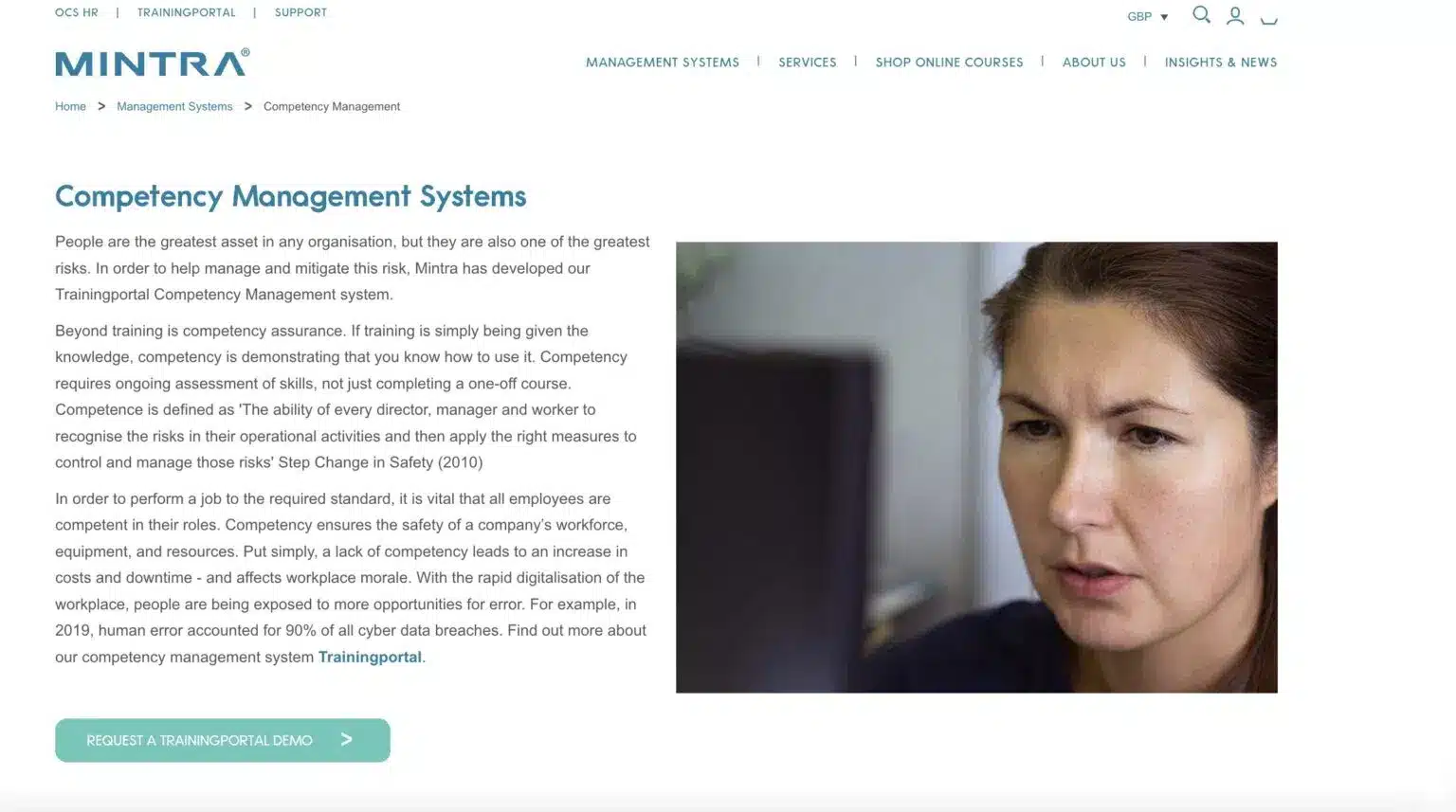
Mintra is an online system for managing employee skills, made for industries where safety is crucial, like shipping, oil and gas, and energy.
Its Training portal system puts learning and making sure people are skilled together. This helps companies watch employee skills, follow the rules, and be safer.
Key Features:
- See All Skills Together: Gives managers one place to view all employee skills, which helps with planning and following rules.
- Digital Learning Integration: Seamlessly integrates e-learning modules with competency assessments, ensuring that training directly addresses identified skill gaps.
- Safety Compliance Focus: Designed to meet the stringent requirements of high-risk industries, helping organizations maintain safety standards and regulatory compliance.
- Find Skill Gaps: Uses up-to-date information to spot where skills are lacking, so training can be targeted.
Pros:
- Industry-Specific Design
- Integrated Learning and Competency Management
- Real-Time Monitoring
Cons:
- Limited Applicability
- Integration Details
Pricing:
Mintra offers custom pricing based on organizational needs and size. For detailed pricing information and to request a quote, please contact Mintra directly.
User Volume:
Mintra helps many different companies in industries where safety is critical, like shipping, oil and gas, and energy. Their systems can support businesses of all sizes, from small companies to big international ones.
Rating:
- Feefo: 4.5/5 based on user reviews.
13. Nestor
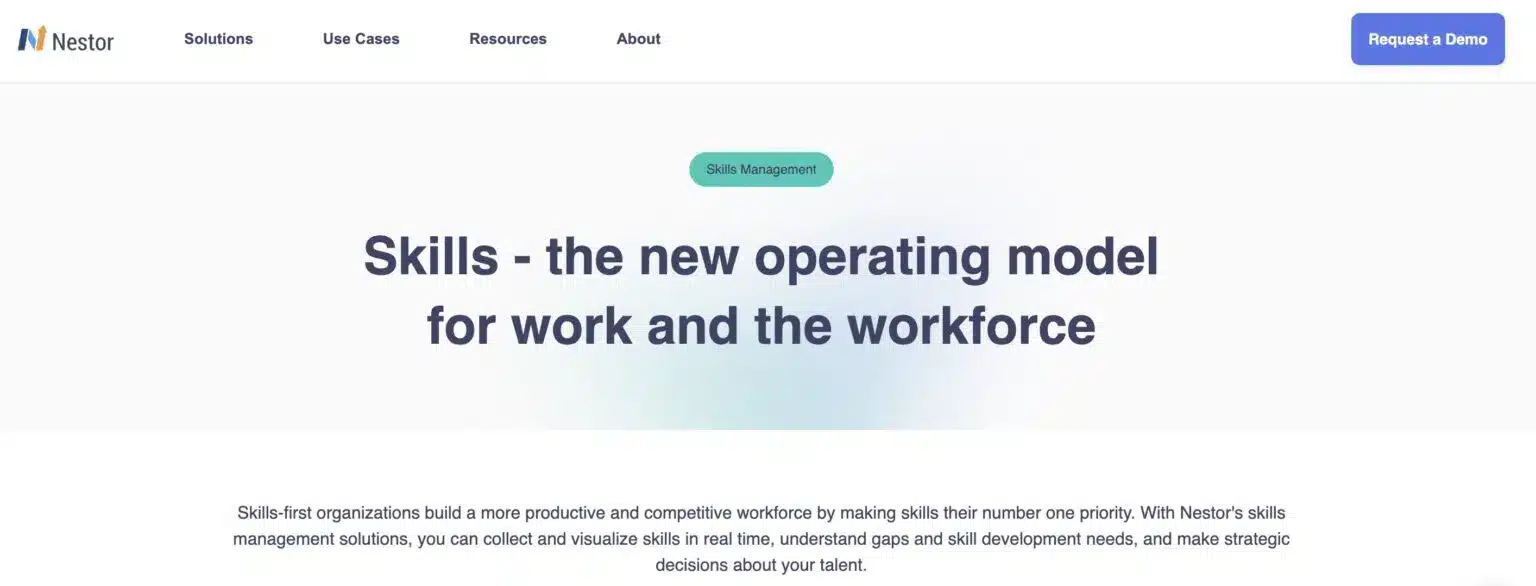
Nestor is a system that focuses on skills to help companies find, use, and strategically place the abilities of their employees.
By leveraging AI-driven insights and a dynamic skills taxonomy, Nestor enables businesses to align talent with organizational goals, track performance trends, and facilitate upskilling and reskilling initiatives.
Key Features:
- Find Skill Gaps: Shows immediately where skills are lacking, so you can create specific development plans.
- Performance Trends Analysis: Monitors individual and team performance over time, aiding in proactive talent management.
- Dynamic Taxonomy: Utilizes an evolving skills framework to adapt to changing organizational needs.
- Real-Time Visibility: Offers dashboards and analytics for immediate insights into workforce capabilities.
- Upskilling and Reskilling Support: Facilitates personalized learning paths to address skill gaps and prepare employees for future roles.
Pros:
- User-Friendly Interface
- High Adoption Rate
- Comprehensive Support
Cons:
- Limited Public Pricing Information
- Feature Development
Pricing:
Nestor uses a subscription payment system, and the price changes depending on how big your company is and what exactly you need. For detailed pricing information, it’s recommended to contact Nestor directly.
User Volume:
Nestor helps many different medium-sized to large companies in areas like money, healthcare, and tech.
Rating:
- G2: 4.9/5 based on 53 reviews.
- Capterra: 4.8/5 based on user reviews.
14. SkillsDB
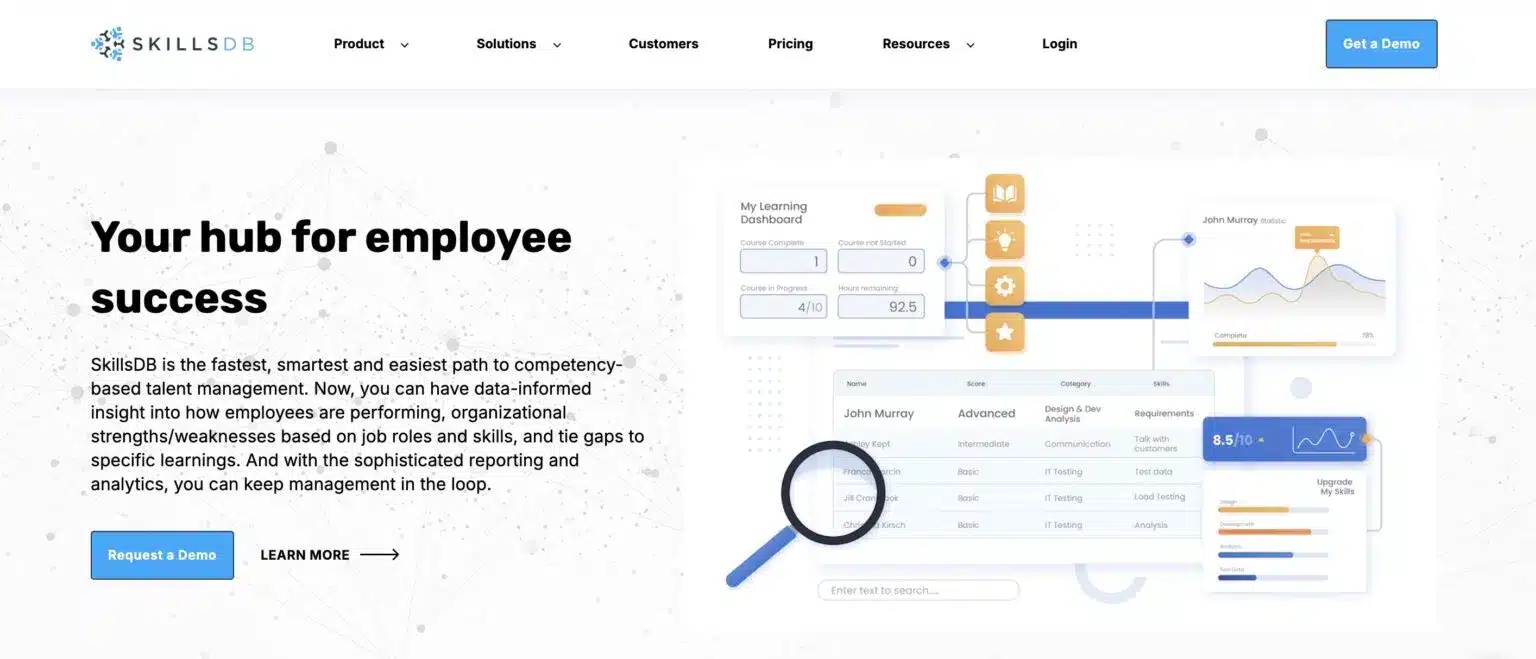
SkillsDB is a system for managing skills that helps companies find, track, and improve what their employees can do.
By offering tools like skills matrices, gap analysis, and individual development plans (IDPs), SkillsDB enables businesses to align workforce capabilities with organizational goals, streamline certification tracking, and support effective succession planning.
Key Features:
- Skills Matrix: Provides a dynamic and visually intuitive tool to assess team strengths and weaknesses, facilitating training needs assessment and overall competency evaluation.
- Gap Analysis: Identifies skill deficiencies across the organization, enabling targeted development initiatives.
- Individual Development Plans (IDPs): Offers personalized learning paths with recommended courses tied to specific job roles and skills.
- Certification Tracking: Monitors employee qualifications and certifications, ensuring compliance and readiness.
- Succession Planning: Assists in identifying and preparing internal candidates for future leadership roles, supporting organizational continuity.
Pros:
- Comprehensive Skill Tracking
- User-Friendly Interface
- Scalable Solutions
- Integration Capabilities
Cons:
- Limited Advanced Features in Starter Plan
- Customization Complexity
Pricing:
$100/month flat fee for up to 50 users, $3 per employee/month for up to 500 employees. Custom pricing for organizations with over 500 employees.
User Volume:
SkillsDB serves a diverse clientele, including organizations across various industries such as finance, education, and manufacturing.
Rating:
- Capterra: 4.7/5 based on user reviews.
- Software Advice: 4.5/5 based on user reviews.
15. HRSG CompetencyCore
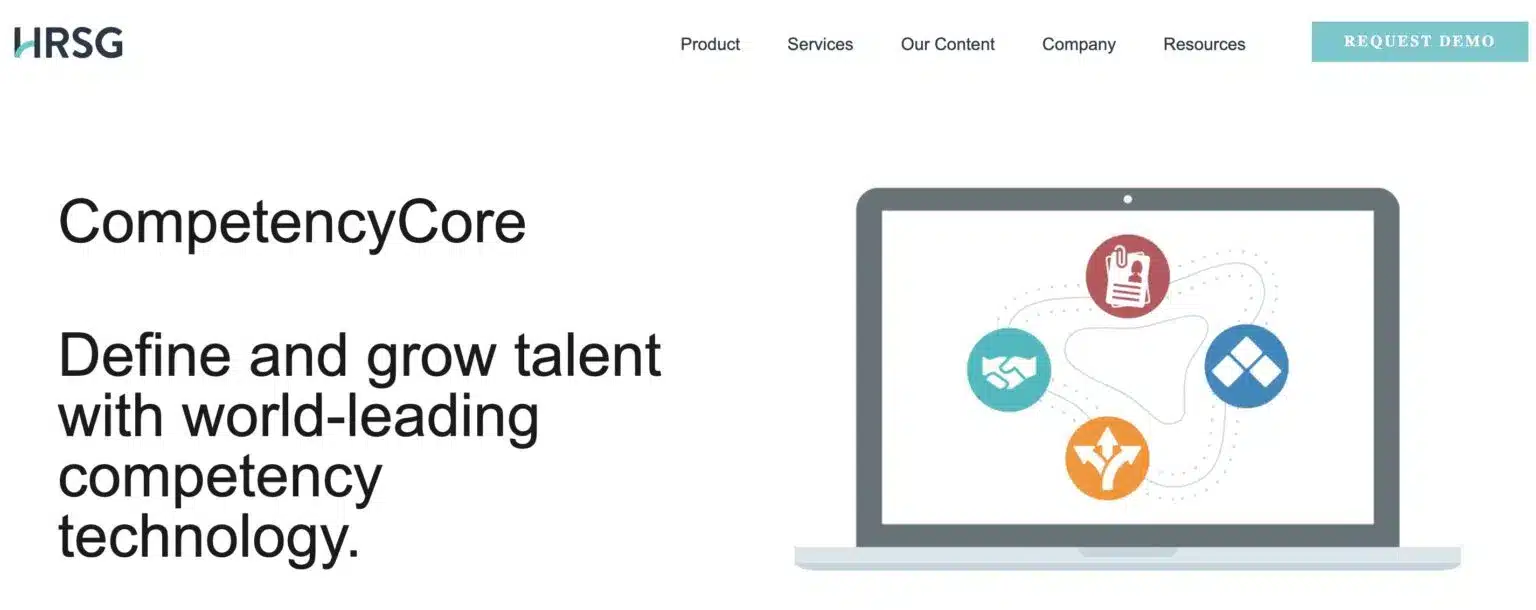
HRSG CompetencyCore is a comprehensive competency management system designed to help organizations define, assess, and develop employee competencies.
By leveraging AI-driven tools and an extensive competency library, CompetencyCore enables businesses to align talent with organizational goals, streamline job descriptions, and support career development initiatives.
Key Features:
- AI Job Matching: Uses smart AI to connect job seekers with the right roles based on their skills, making hiring faster.
- Competency Mapping: Offers tools to map competencies to job roles, ensuring clarity in expectations and performance standards.
- Career Navigation: Provides employees with clear career paths and development opportunities aligned with organizational needs.
- Growth Plans: Helps create personalized plans for employees to improve their skills and grow.
- Job Description Libraries: Includes a comprehensive library of job descriptions to standardize roles and responsibilities across the organization.
Pros:
- Extensive Competency Library
- User-Friendly Interface
- Integration Capabilities
Cons:
- Pricing Transparency
- Learning Curve
Pricing:
HRSG CompetencyCore offers customized pricing based on organizational needs and size. For detailed pricing information and to request a quote, please contact HRSG directly.
User Volume:
HRSG CompetencyCore helps many different kinds of companies in areas like healthcare, money, and tech. Their system can be scaled to work for businesses of all sizes, from small startups to big global corporations.
Rating:
- G2: 4.6/5 based on user reviews.
- Capterra: 4.0/5 based on user reviews.
Implementing Competency Management Software
Rolling out a new system is more than just switching tools—it’s about aligning people, processes, and goals for long-term impact.
Assessment of Organizational Needs
Define what you’re solving for—skill gaps, succession planning, performance clarity. A quick skills audit helps align goals with the right platform features.
Stakeholder Engagement
Involve HR, team leads, IT, and end-users early. Their input ensures better system alignment, smoother rollout, and higher adoption.
Training and Support
Offer hands-on training and easy-to-access support. Pick a vendor that provides strong onboarding and ongoing help as your needs evolve.
Continuous Evaluation
Track KPIs like skill gap closure or internal mobility. Review user feedback regularly and tweak your approach to keep the system relevant.
Your Next Move: Build with Skills, Not Assumptions
Great teams aren’t built on resumes. They’re built on skills, potential, and direction. A competency management system gives managers the clarity to develop talent with purpose and gives employees a roadmap to grow.
It’s not just about tracking what people can do — it’s about unlocking what they could do next.
Ready to put your talent strategy into motion? Let Peoplebox.ai help you turn skill visibility into team performance.
Frequently Asked Questions(FAQs)
What Is a Competency Management Software?
A competency management software is a centralized platform that allows organizations to define required skills for every role, assess current talent against those requirements, identify gaps, and build targeted development plans. Think of it as a GPS for talent development — not just tracking where employees are, but guiding where they need to go.
Whether it’s tracking technical proficiencies, leadership readiness, or role-specific competencies, a strong competency management system software helps align people’s strategy with business goals.
What are the key features of CMS?
When evaluating a competency management software, these features make all the difference:
- Customizable competency frameworks
Every org is different. You need a system that reflects your roles, not a generic template. - Skill gap analysis
Identify gaps with precision, so training budgets are spent wisely. - Integration with HR systems
A standalone tool won’t cut it. Seamless sync with performance management or LMS tools matters.
Real-time analytics
Get instant visibility into where your team stands — and how they’re progressing.
What Are the 5 Key Components of Competency?
Competency is made up of five main elements that together define how well someone can perform in a role:
- Knowledge – What a person knows about a subject, including facts, theories, and principles.
- Skills – The practical ability to apply that knowledge to complete tasks effectively.
- Abilities – Natural or developed capabilities that support performance, like problem-solving or critical thinking.
- Behaviors – How someone acts on the job, including attitude, communication, and teamwork.
- Certifications/Credentials – Official proof of expertise, earned through training or assessments.
What is a Competency-Based Management System?
A competency-based management system helps organizations define, track, and manage the skills and capabilities needed for success. It identifies gaps between required and existing competencies, monitors employee development, and records real-world experience to back up skill claims—ensuring teams have the right expertise to perform effectively.
What are the Benefits of Competency Management Software?
- Boosted Employee Performance :By aligning individual skills with organizational goals and offering targeted development, the software helps enhance productivity and performance.
- Stronger Talent Management: Facilitates the identification and growth of high-potential employees, supports effective succession planning, and fosters a more adaptable workforce.
- Operational Efficiency: Automates processes like skill assessments, training plans, and performance tracking—reducing manual effort and streamlining HR operations.
- Higher Employee Engagement :Offers clear development paths, personalized learning opportunities, and regular feedback, contributing to improved motivation and job satisfaction.
- Smarter, Data-Driven Decisions: Delivers actionable insights into workforce capabilities, helping leaders make informed choices around hiring, development, and resource allocation.






